Financial System Adaptability and Resilience
This research group investigates critical aspects of financial system adaptability and resilience. First, it analyses the impact of natural disasters on financial systems. Second, the group aims to investigate the effects of political preferences for the green transition. Third, the group's research analyses the role of culture in economies.
Research Cluster
Financial Resilience and RegulationYour contact

- Department Financial Markets
EXTERNAL FUNDING
08.2022 ‐ 07.2025
OVERHANG: Debt overhang and green investments - the role of banks in climate-friendly management of emission-intensive fixed assets
The collaborative project “Debt Overhang and Green Investments” (OVERHANG) aims to investigate the role of banks in the climate-friendly management of emission-intensive fixed assets. This will identify policy-relevant insights on financial regulation, government-controlled lending and financial stability, as well as raise awareness among indebted stakeholders.
01.2015 ‐ 12.2019
Interactions between Bank-specific Risk and Macroeconomic Performance
07.2016 ‐ 12.2018
Relationship Lenders and Unorthodox Monetary Policy: Investment, Employment, and Resource Reallocation Effects
We combine a number of unique and proprietary data sources to measure the impact of relationship lenders and unconventional monetary policy during and after the European sovereign debt crisis on the real economy. Establishing systematic links between different research data centers (Forschungsdatenzentren, FDZ) and central banks with detailed micro-level information on both financial and real activity is the stand-alone proposition of our proposal. The main objective is to permit the identification of causal effects, or their absence, regarding which policies were conducive to mitigate financial shocks and stimulate real economic activities, such as employment, investment, or the closure of plants.
Refereed Publications
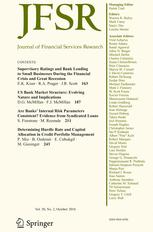
Political Uncertainty and Bank Loan Contracts: Does Government Quality Matter?
in: Journal of Financial Services Research, December 2021
Abstract
We investigate the relation between political uncertainty and bank loan spreads using a sample of loan contracts for the G20 firms during the period from 1982 to 2015. We find that banks charge firms higher loan spreads and require more covenants during election years when domestic political risks are elevated. Greater differences in the support ratios of opinion polls on candidates lead to the lower cost of bank loans. This political effect also lessens when the government quality of the borrower’s country is better than that of the lender’s country. Better quality government can lower the political risk component of bank loan spreads.
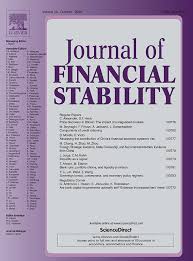
The Impact of Political Uncertainty on Institutional Ownership
in: Journal of Financial Stability, December 2021
Abstract
This paper provides original evidence from institutional investors that political uncertainty greatly affects investment behavior. Using institutional holdings of common stock, we find that institutions significantly reduce their holdings by 0.8–2.3% points during presidential election years. Such effect holds for gubernatorial elections with cross-state-border difference-in-difference analysis and for tests using a political uncertainty index. The effect is the opposite for American Depository Receipts (ADRs). In addition, we find that institutions benefit financially from the observed strategy, and such strategy is in line with predicted outcomes of presidential election polls.

Banking Globalization, Local Lending, and Labor Market Effects: Micro-level Evidence from Brazil
in: Journal of Financial Stability, October 2021
Abstract
Recent financial crises have prompted the interest in understanding how banking globalization interacts with domestic institutions in shaping foreign shocks’ transmission. This paper uses regional banking data from Brazil to show that a foreign funding shock to banks negatively affects lending by their regional branches. This effect increases in the presence of frictions in internal capital markets, which affect branches’ capacity to access funding from other regions via intra-bank linkages. These results also matter on an aggregate level, as municipality-level credit and job flows drop in exposed regions. Policies aiming to reduce the fragmented structure of regional banking markets could moderate the propagation of foreign shocks.
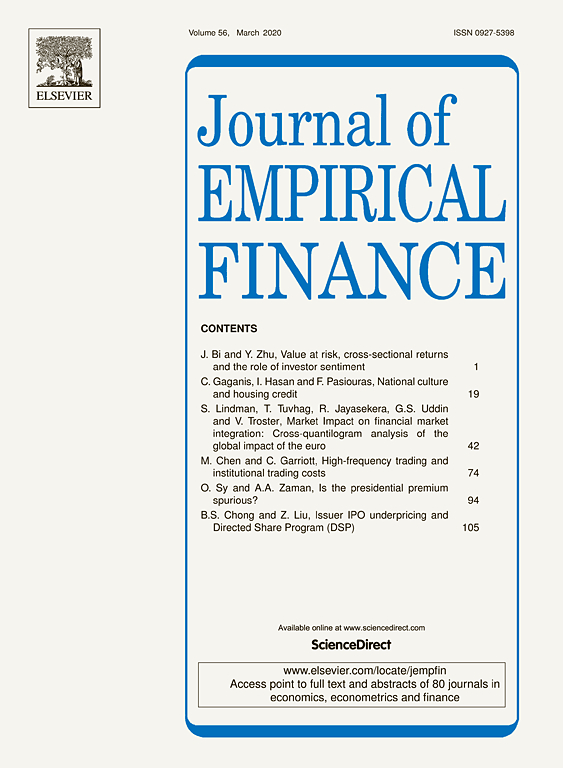
Stock Price Fragility and the Cost of Bank Loans
in: Journal of Empirical Finance, September 2021
Abstract
This study examines whether the flow volatility experienced by institutional investors affects firms’ financing costs. Using Greenwood and Thesmar’s (2011) stock price fragility measure, we find that there is a positive relationship between fragility and firms’ costs of bank loans. This effect is most pronounced when lenders rely more on institutional shareholders to discipline corporate management, or when loans are made by relationship lenders, suggesting that unstable flows could weaken institutional investors’ monitoring effectiveness and strengthen relationship banks’ bargaining power.
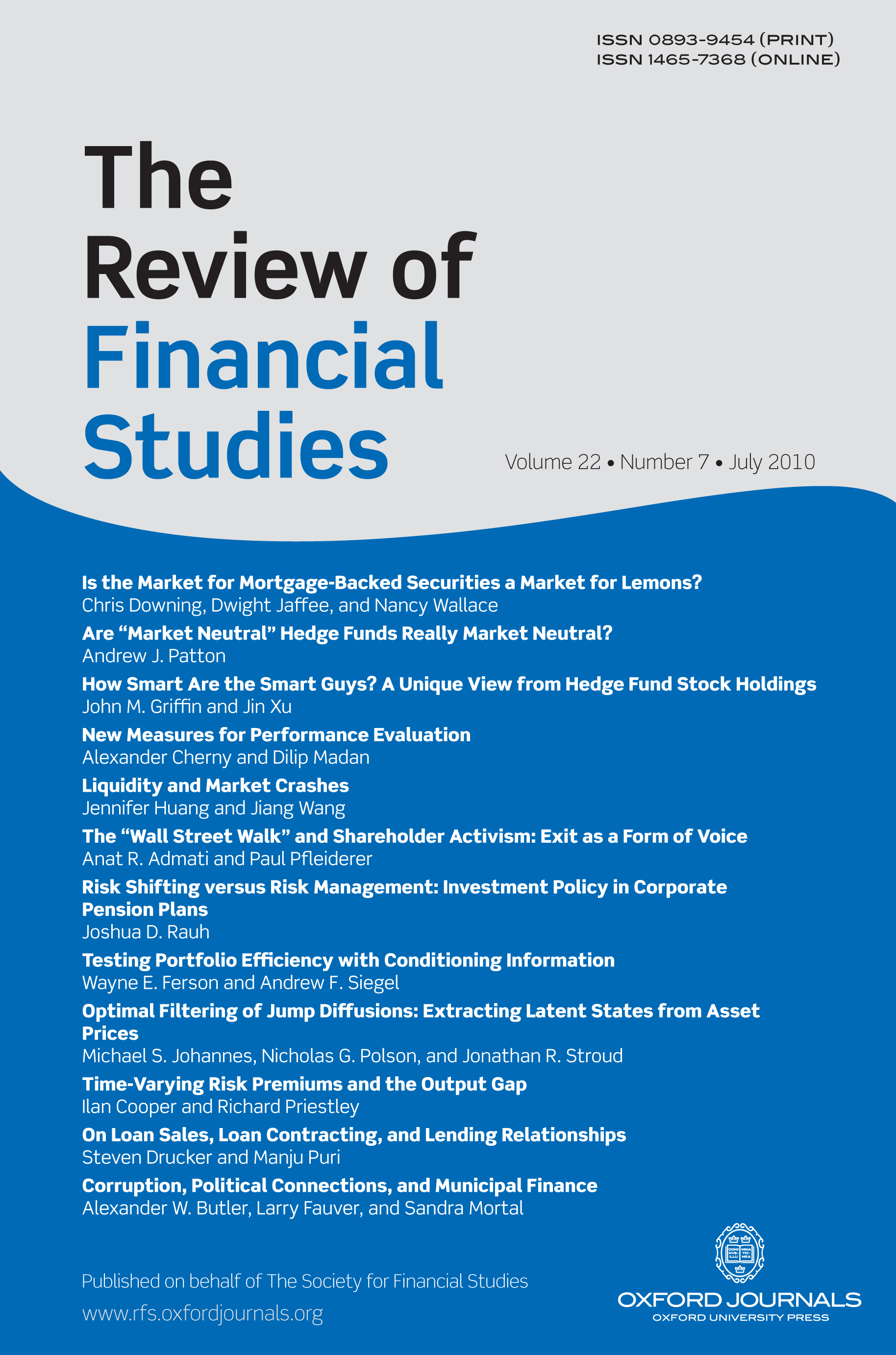
Political Cycles in Bank Lending to the Government
in: Review of Financial Studies, No. 6, 2021
Abstract
We study how political party turnover after German state elections affects banks’ lending to the regional government. We find that between 1992 and 2018, party turnover at the state level leads to a sharp and substantial increase in lending by local savings banks to their home-state government. This effect is accompanied by an equivalent reduction in private lending. A statistical association between political party turnover and government lending is absent for comparable cooperative banks that exhibit a similar regional organization and business model. Our results suggest that political frictions may interfere with government-owned banks’ local development objectives.
Working Papers

Covered Bonds and Bank Portfolio Rebalancing
in: Norges Bank Working Papers, No. 6, 2021
Abstract
We use administrative and supervisory data at the bank and loan level to investigate the impact of the introduction of covered bonds on the composition of bank balance sheets and bank risk. Covered bonds, despite being collateralized by mortgages, lead to a shift in bank lending from mortgages to corporate loans. Young and low-rated firms in particular receive more credit, suggesting that overall credit risk increases. At the same time, we find that total balance sheet liquidity increases. We identify the channel in a theoretical model and provide empirical evidence: Banks with low initial liquidity and banks with sufficiently high risk-adjusted return on firm lending drive the results.

Cultural Resilience, Religion, and Economic Recovery: Evidence from the 2005 Hurricane Season
in: IWH Discussion Papers, No. 9, 2021
Abstract
This paper investigates the critical role of religion in the economic recovery after high-impact natural disasters. Exploiting the 2005 hurricane season in the southeast United States, we document that establishments in counties with higher religious adherence rates saw a significantly stronger recovery in terms of productivity for 2005-2010. Our results further suggest that a particular religious denomination does not drive the effect. We observe that different aspects of religion, such as adherence, shared experiences from ancestors, and institutionalised features, all drive the effect on recovery. Our results matter since they underline the importance of cultural characteristics like religion during and after economic crises.
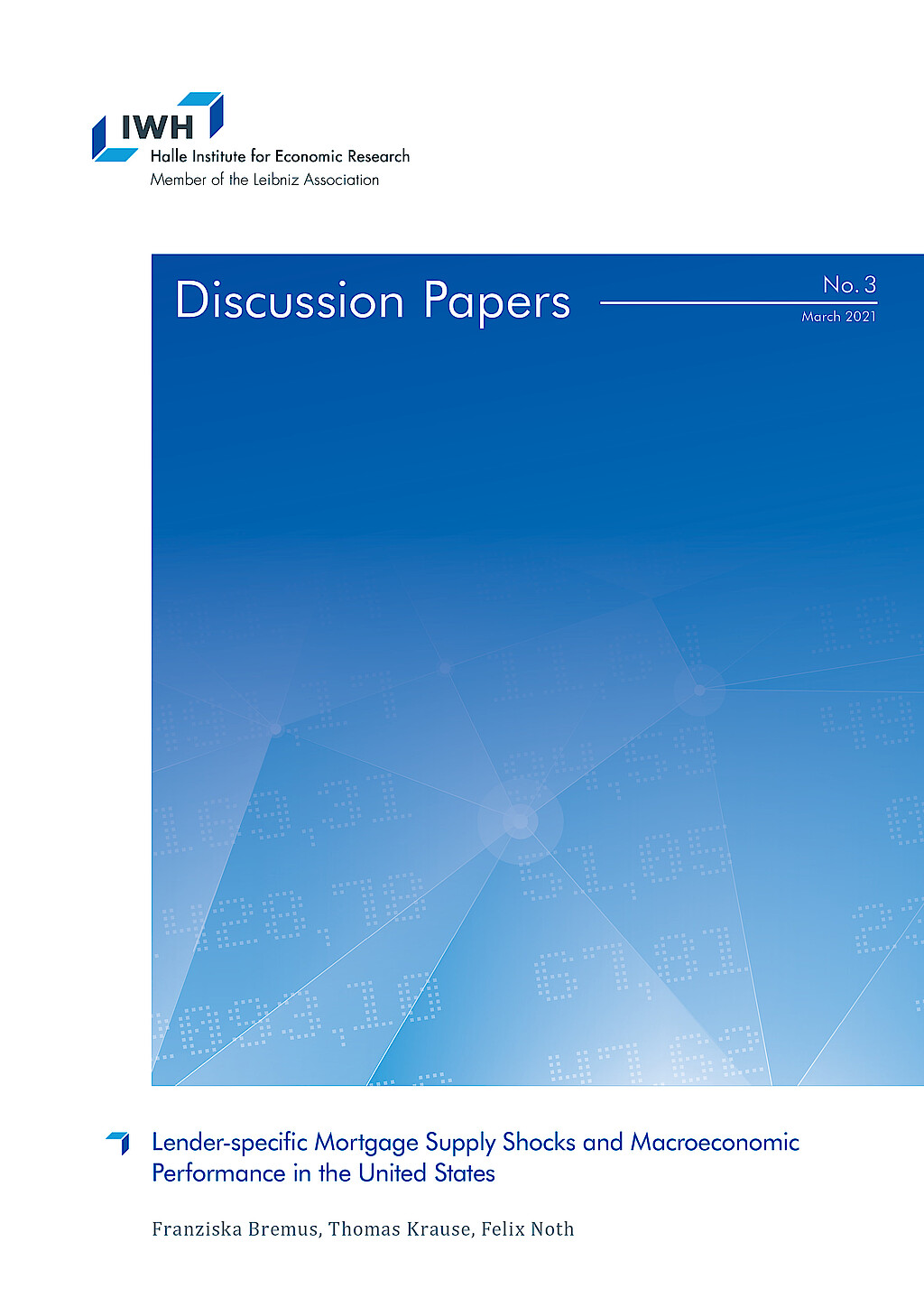
Lender-specific Mortgage Supply Shocks and Macroeconomic Performance in the United States
in: IWH Discussion Papers, No. 3, 2021
Abstract
This paper provides evidence for the propagation of idiosyncratic mortgage supply shocks to the macroeconomy. Based on micro-level data from the Home Mortgage Disclosure Act for the 1990-2016 period, our results suggest that lender-specific mortgage supply shocks affect aggregate mortgage, house price, and employment dynamics at the regional level. The larger the idiosyncratic shocks to newly issued mortgages, the stronger are mortgage, house price, and employment growth. While shocks at the level of shadow banks significantly affect mortgage and house price dynamics, too, they do not matter much for employment.
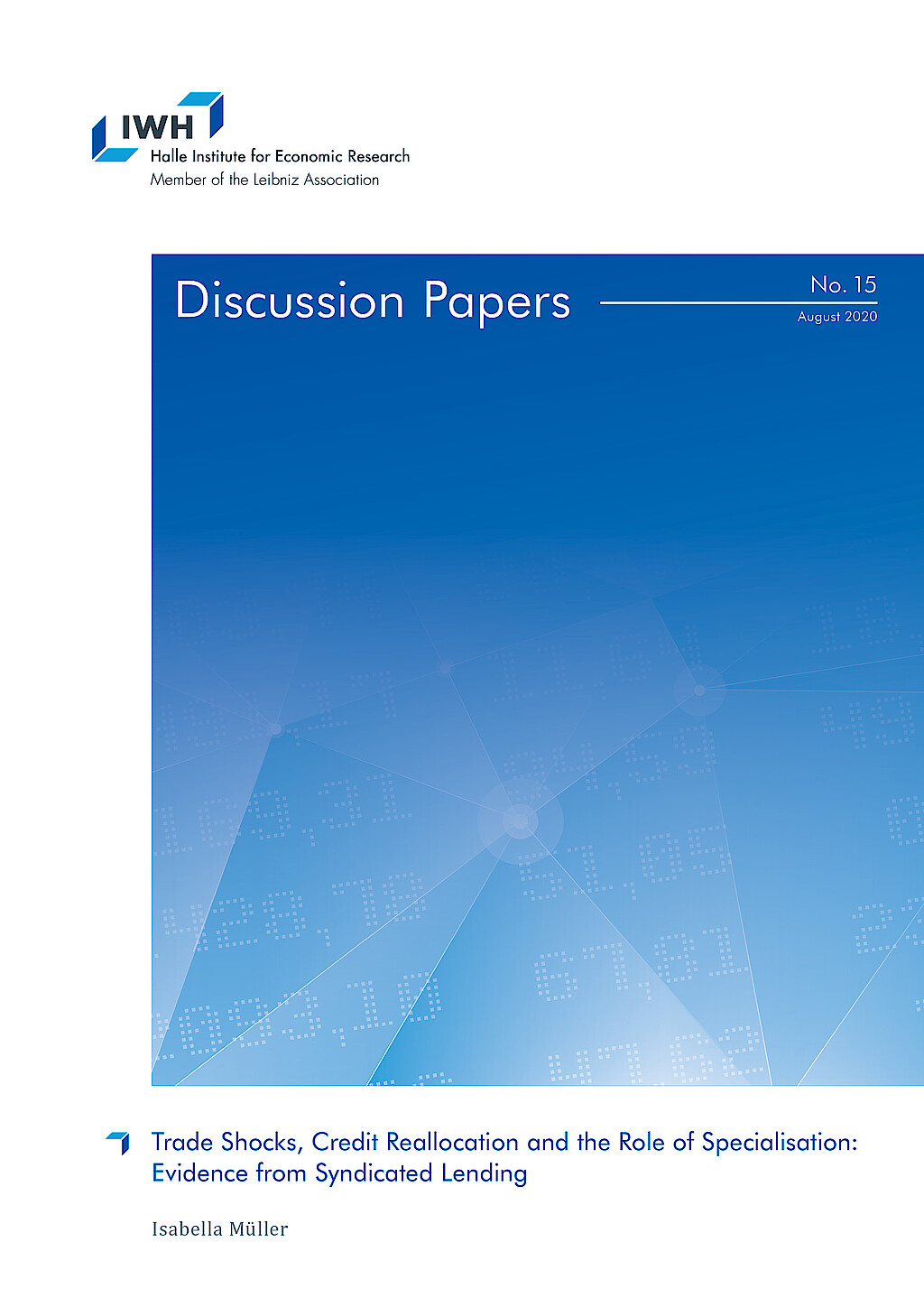
Trade Shocks, Credit Reallocation and the Role of Specialisation: Evidence from Syndicated Lending
in: IWH Discussion Papers, No. 15, 2020
Abstract
This paper provides evidence that banks cut lending to US borrowers as a consequence of a trade shock. This adverse reaction is stronger for banks with higher ex-ante lending to US industries hit by the trade shock. Importantly, I document large heterogeneity in banks‘ reaction depending on their sectoral specialisation. Banks shield industries in which they are specialised in and at the same time reduce the availability of credit to industries they are not specialised in. The latter is driven by low-capital banks and lending to firms that are themselves hit by the trade shock. Banks‘ adjustments have adverse real effects.
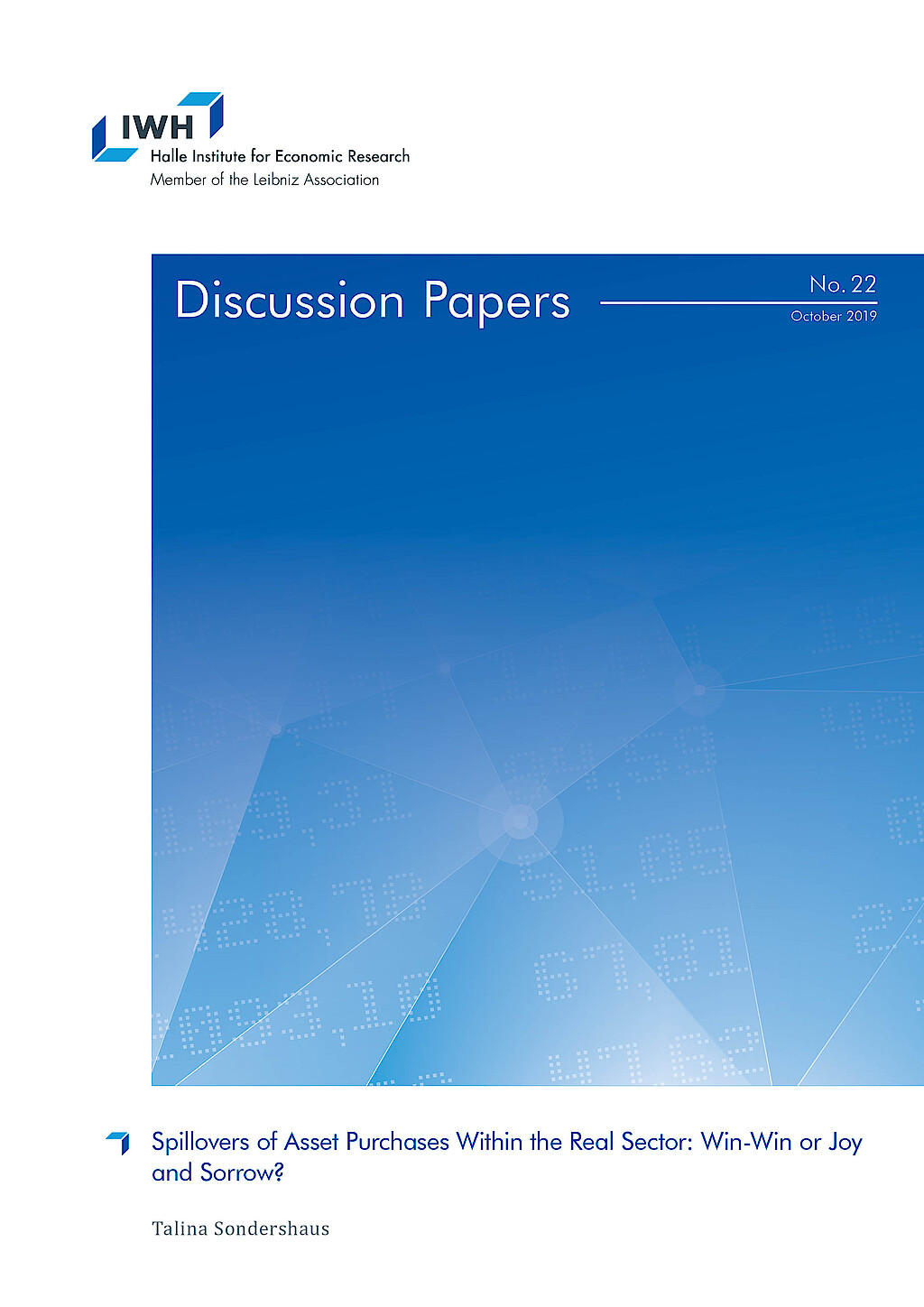
Spillovers of Asset Purchases Within the Real Sector: Win-Win or Joy and Sorrow?
in: IWH Discussion Papers, No. 22, 2019
Abstract
Events which have an adverse or positive effect on some firms can disseminate through the economy to firms which are not directly affected. By exploiting the first large sovereign bond purchase programme of the ECB, this paper investigates whether more lending to some firms spill over to firms in the surroundings of direct beneficiaries. Firms operating in the same industry and region invest less and reduce employment. The paper shows the importance to consider spillover effects when assessing unconventional monetary policies: Differences between treatment and control groups can be entirely attributed to negative effects on the control group.



















